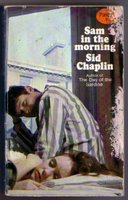DJ Taylor admires former miner Sid Chaplin's portrayals of working-class worlds
Searching for a reference to Sid Chaplin in Margaret Drabble's lavish recension of the Oxford Companion to English Literature, I came upon the three-word signpost: "See REGIONAL NOVEL". Ploughing through the scant column-and-a-half devoted to that sub-genre, I ended up with half a sentence about "sociologically attuned vehicles for working-class concerns" in which Lewis Grassic Gibbon's A Scots Quair is said to anticipate "the novels of Durham-born ex-miner Sid Chaplin (see his Day of the Sardine, 1961)". It seems a poor sort of reward for a man who, while thoroughly overlooked by literary history, wrote at least two novels capable of holding their own in any serious check-list of 1960s British fiction.
Sid Chaplin (1916-1986) was one of those writers — very common in the first half of the last century — who contrive to burrow their way through the social ant-heap of which they are a part without ever quite losing sight of the world they knew in childhood or the impetus that prompted them to write. Chaplin may have ended his working career in a fairly exalted desk job at the National Coal Board, but he began it down the Grimethorpe pit and his point of view seldom strays very far from the angle of the north-eastern working class. Even in his late forties, an age at which most novelists are taking up residence in the drawing room, he was still setting his fiction in the Newcastle back streets, and the sense of unutterable conviction — the thought that everything here was seen or heard before it passed through the filtering medium of print — hangs over his pages like the Tyneside fogs.
To read even a few pages of Chaplin's work is to be plunged immediately into a fictional equivalent of the working-class landscapes described in Richard Hoggart's The Uses of Literacy (1957): a dense little communal world crammed with lodgers and monstrous middle-aged women in which the hero's mother is always called "the old lady", the landlord is a besuited bloodsucker and for a wife not to have her husband's supper on the table when he comes home from work is regarded as a sin against nature. In fact this feeling of hidebound, street-corner inertia is deceptive, for one of the strongest sensations to emerge from Chaplin's novels is that of a society in flux. The Watchers and the Watched (1962) is among other things a case history of a disappearing world: the old back-to-backs of the Scottswood Road are going down beneath a tide of bulldozers, a more vagrant, anonymous life is taking shape in which people no longer know their neighbours or stop to chat and immigrants (the novel ends with a race riot) are moving in.
Quite as illusory, it turns out, is the idea of working-class solidarity. One of the chief lessons to be drawn from The Day of the Sardine is the futility of expecting any kind of revolutionary fervour from the lower orders. The world inhabited by Arthur Haggerston and his ever-anxious mother is spiritually only a trolley-bus ride away from the Nottingham tenement graced by Sillitoe's Arthur Seaton: a kind of anarchic backwater where authority, whether represented by the policeman or the council, is held in stony contempt and the whole street is capable of ganging up on the rent-collector or the talleyman. And yet one of Chaplin's most subtle tricks as a novelist is to show how the solidarity craved by his young male protagonists is being steadily rubbed away.
Politics, in the form of the municipal Labour Party, is seen as a kind of licensed swindle: there is a sourly funny scene in The Day of the Sardine where Arthur revenges himself on his corrupt contractor uncle, forever boasting about his friendship with Ernest Bevin, by blocking up the concrete pipe he is examining with several tons of rubble. "He'd always thought of the community as a sleeping, good-humoured giant", blacksmith Tiger Mason in The Watchers and the Watched reflects, "hard-drinking, hard-working and hospitable. Now that comfort was cracking."
Inevitably sentences of this kind are a social historian's dream, but it would be wrong to see Chaplin's two best novels merely as fragments of dramatised sociology. While some of their incidental detail occasionally has the air of reportage, at the heart of each lies a study in working-class existentialism: the fate of the individual who finds himself unexpectedly oppressed by and detached from the society of which he is a part.
Teenaged Arthur Haggerston, flitting from one dead-end job to another, involved (like every other working-class hero of his day) with an older woman while making sheep's eyes at virginal Dorothy from the back-street mission, notes that "Every day I jumped out of bed with a feeling of being trapped." Tiger Mason, married at 22 and billeted on his wife's interfering relatives, simply wants to make good use of his time and cultivate the vague sense of purpose that stirs within him. Like most of the other heroes of the post-war working-class novel — Sillitoe's Seaton or David Storey's Arthur Machin —each burns with a tremendous sense of vitality, while regretting the missed opportunities and the severed friendships (Arthur falls out with his friend Nosey and breaks up the gang; Tiger is isolated by his marriage) that litter their path through life.
The eternal technical challenge faced by a novelist of the Chaplin/Sillitoe school is somehow to square the rough-and-ready articulations of the cast with the novel's ulterior sense of design. Chaplin's great strength, happily enough, is his dialogue: spare, allusive, in which long, unspoken paragraphs seem to drift beneath the surface. There is a wonderful page or two in The Watchers and the Watched in which the newly married Masons go out blackberrying with three of Tiger's pals. Two of these have brought their girlfriends: one verging on flooziedom, the other a deeply self-conscious middle-class miss. The fragments of conversation that follow, half-tense, half-comic ("There," Daphne explains, busy powdering her nose at the back of the bus, "Ah can do no more ... It was a mistake, Neddy boy, Ah knew it from the start") prepare the ground for the afternoon's faintly sinister conclusion.
Here, as elsewhere in Chaplin's work, drifts the scent of a tremendous, fugitive lyricism, a terrible yearning for summer afternoons spent far away from the pit and the cramped back-alleys where privacy barely exists and practically every human activity is liable to be spied upon by half-a-dozen onlookers. Significantly, the posthumous collection of short pieces (including several of the columns he wrote for this newspaper) put together by his widow and son was called In Blackberry Time. No doubt it will be difficult to persuade the literary historians of the future that he was anything more than a representative figure ("see REGIONAL NOVEL" etc). On the other hand few novelists have quite so comprehensively demonstrated the hulking debt that post-war British fiction owes to Our Friends in the North.
From
The Guardian, Saturday April 30 2005

